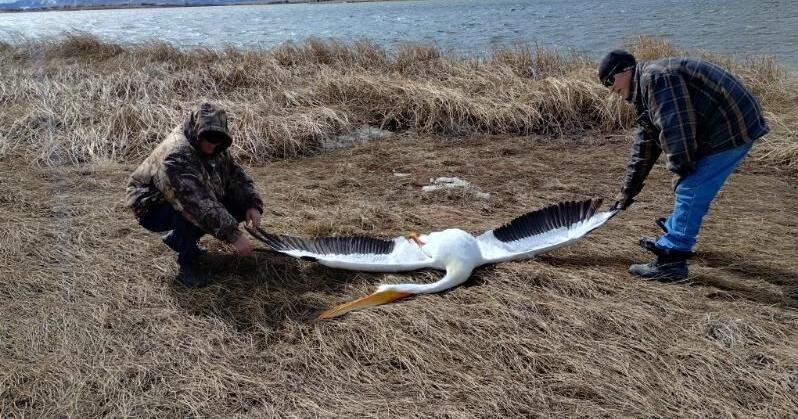A southeast Wyoming pelican-killing operation will end after one heated season, though one man trying to protect stocked trout says he’ll fight for the right to keep shotgunning the hefty birds.
After WyoFile reported on a dispute that’s divided the 9-Mile Lake community outside of Laramie, U.S. Fish and Wildlife Service officials reached out to say that they don’t plan on authorizing another exemption to the Migratory Bird Treaty Act — the law that ordinarily protects pelicans from hunting. The permit will not be reissued because the Fish and Wildlife Service updated its regulations in April with new criteria for issuing lethal migratory bird depredation permits.
“Permits may not be issued … for abundant or non-native species, nor to protect resources for recreational purposes (i.e., stocking recreational fisheries),” the new regulations read.
People are also reading…
The changed criteria specifically excludes what the Alco Rod and Gun Club was seeking to protect: the put-and-take rainbow, brown, brook and golden trout that drew opportunistic native pelicans into the small lake each summer.
The rod and gun club’s initial permit to kill 30 pelicans was issued in January, a few months before the regulation change. One of the two men who handled shotgunning pelicans for Alco Rod and Gun Club told WyoFile he isn’t happy about the change and will push to retain the right to continue killing the piscivorous birds.
“It boils down to this: If we can’t control the pelicans, we’re not going to have a fishing lake,” Pete Kontaxes said. “They will definitely come back in force if we’re not allowed to control them at all.”
Kontaxes described 9-Mile Lake as having a burgeoning population of pelicans that have completely ruined a once-popular fishery. The club, he said, spends a hefty sum annually stocking trout in the manmade lake — a water-filled former rock quarry on the Laramie Plains.
“I don’t want to spend $25,000 just to feed pelicans,” Kontaxes said. “That’s what this basically amounts to.”
But other current and former Alco Rod and Gun Club members who live in the area welcomed what’s likely the end of 9-Mile Lake’s pelican-killing era.
“That’s good,” local resident Andy Anderson said. “They should not be shot simply because they eat the fish.”
Kontaxes and Alco Rod and Gun Club President Mark Rozman’s pelican pursuit was a day-after-day affair that drove a wedge in the neighborhood and even had the effect of preventing people from picnicking and recreating, Anderson said.
“It’s not a fun lake anymore for anybody,” he said.
Longtime 9-Mile Lake resident Tom Bustinduy saw things similarly. The gun club losing its permit is “good,” he said.
“Why are we shooting the pelicans?” Bustinduy asked. “I don’t believe that they are impacting the quality of the fishing. That’s my opinion.”
Pelicans numbers aren’t closely monitored in Wyoming, where they’re classified as a “species of greatest conservation need” because their breeding range in the state is relatively limited. Populations have been on the upswing for decades — but only after “precipitous” historic declines, Wyoming Game and Fish Nongame Bird Biologist Zach Wallace said.
“Similar to peregrine falcons and bald eagles, they were affected by DDT,” he said. “That whole situation with eggshell thinning.”
As populations have bounced back, pelicans have established new breeding colonies in Wyoming, according to the most recent account of the species.
While other states have more regularly encountered pelican-related damage to fisheries, Alco Rod and Gun Club’s depredation permit was one of only two that the Fish and Wildlife Service has issued in Wyoming, according to spokesman Joe Szuszwalak. The other, he said, is issued to the U.S. Department of Agriculture’s Wildlife Services, just giving that agency “general” permission to take out damage-causing pelicans.
Although Alco Rod and Gun Club’s pelican-killing days look like they’ve run out, Kontaxes plans to push the issue.
“We’re going to contact some people higher up,” he said. “We’ll certainly apply for another permit. We’ll see what happens.”
But the Fish and Wildlife Service has already signaled its likely response if the club applies for the same type of permit using the same justification.
“Given this new guidance, it wouldn’t be a renewal,” Szuszwalak said.





